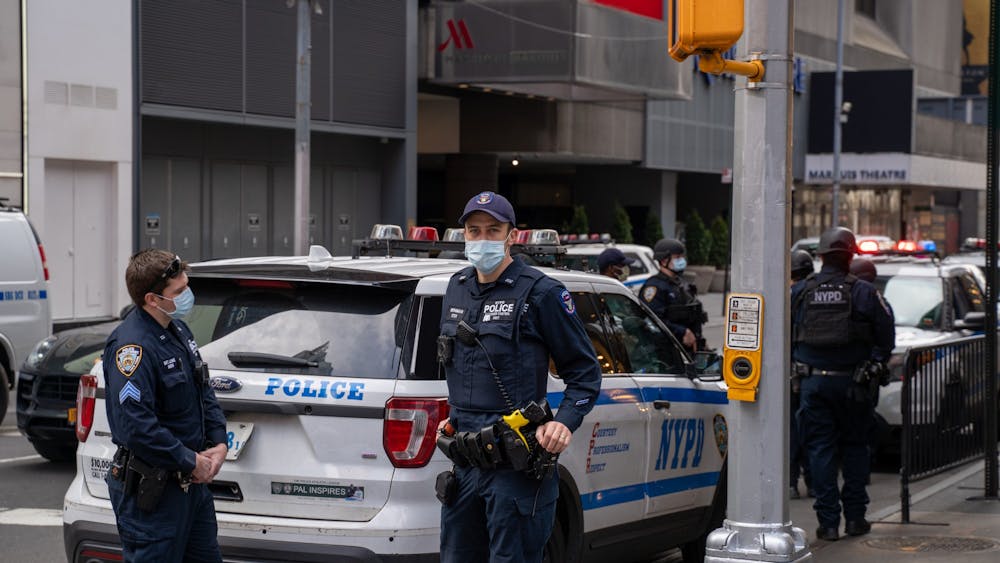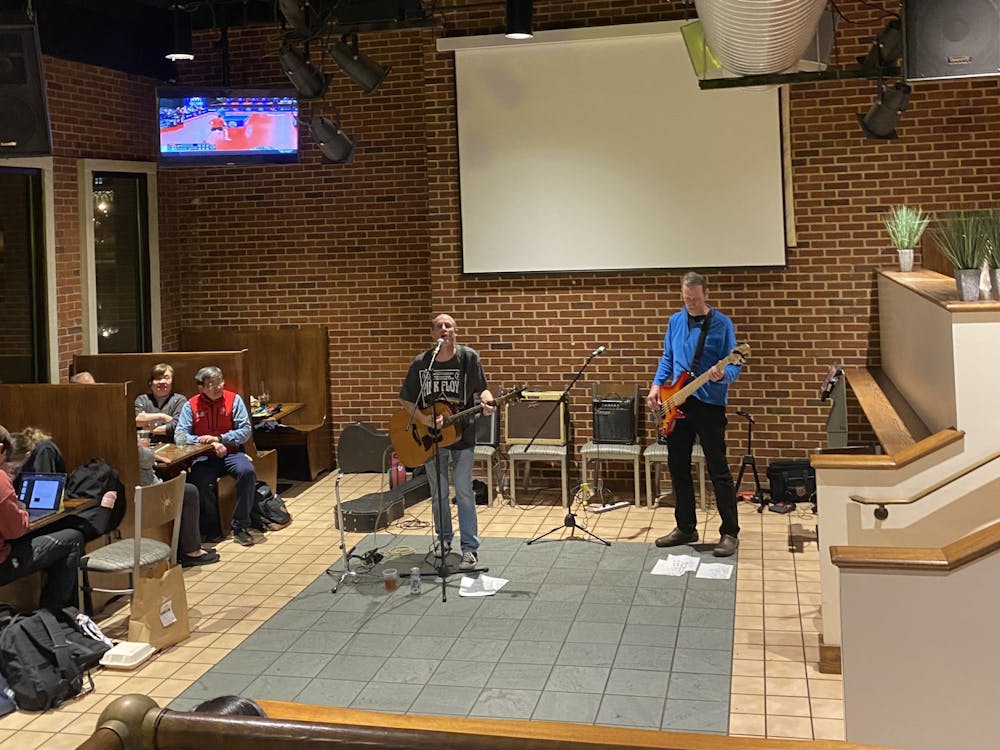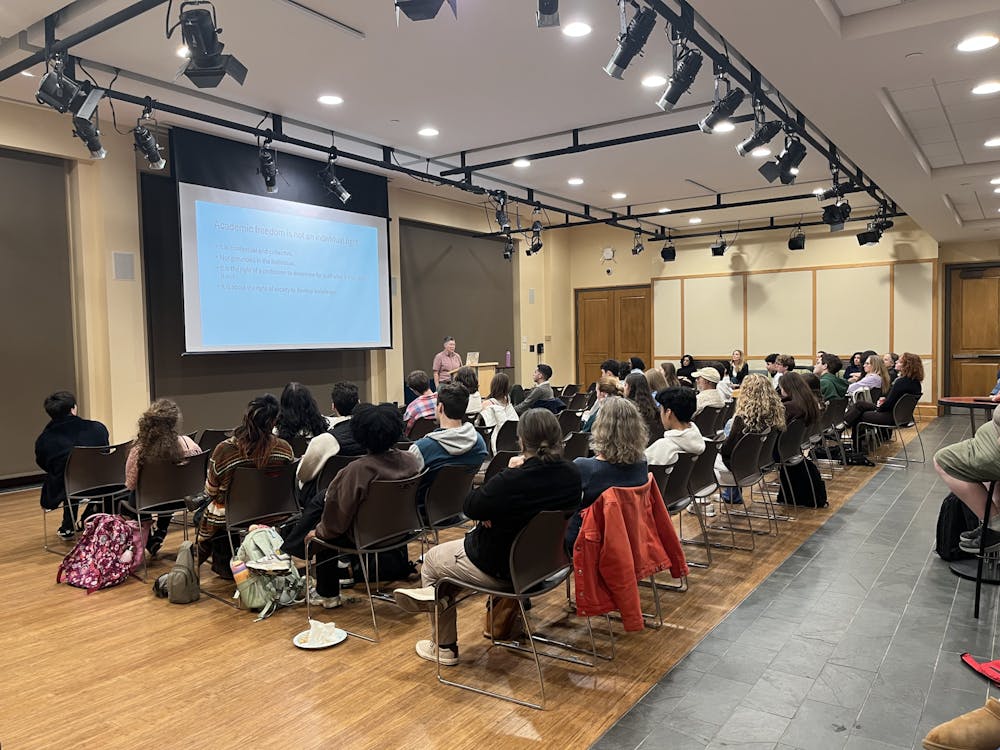NEW YORK-- For the 343 University of Richmond students from New York, the COVID-19 pandemic brings dire consequences and comparisons to 9/11.
UR announced that it would move to remote instruction on March 11 with a hope to switch back to in-person instruction on April 3. Shortly after UR's transition to remote learning, UR canceled the semester on campus and announced remote learning would continue for the remainder of the semester.
Students from New York not only dealt with the mental strain of being forced from campus but also concerns for their safety and that of their families in the national epicenter of the pandemic. There are 343 UR students from New York state, said Sunni Brown, director of media and public relations.
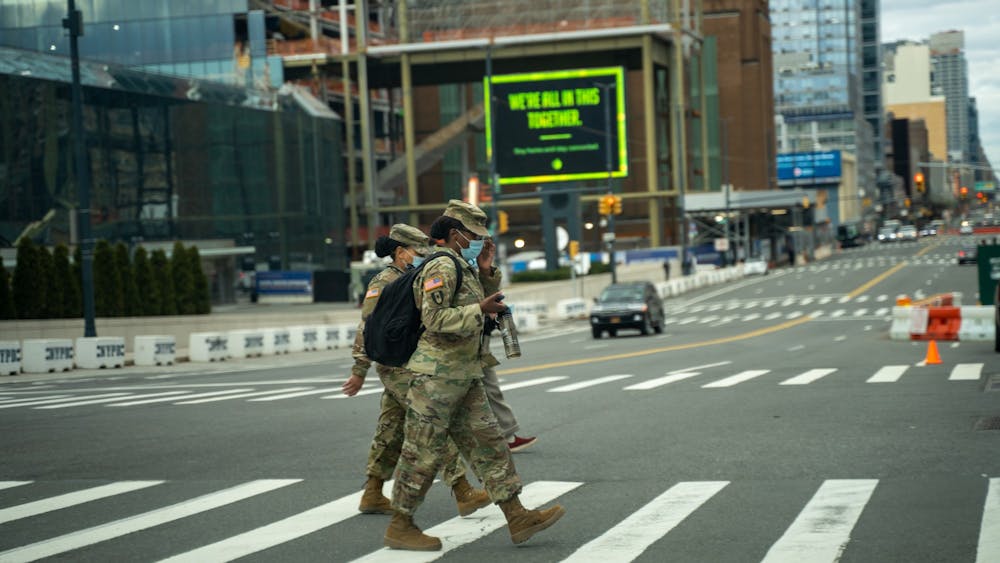
Army soldiers leaving the Jacob Javitz Center on April 4, 2020. The convention center is currently being used as a temporary hospital.
Beyond New York City, suburbs in Westchester, Rockland, Suffolk and Nassau counties, as well as parts of New Jersey and Connecticut, have all been struck hard by COVID-19. Gov. Andrew Cuomo estimated 16,000 deaths on April 1.
There have been around 20,000 deaths from COVID-19 across the state of New York as of April 21.
Junior Rob Papandrea said he was seeing similarities between COVID-19 and 9/11. Papandrea said he had lost three relatives to COVID-19. They were 53, 71 and 93, Papandrea said, and he was unaware of any pre-existing health issues.
“It is becoming increasingly rare that people don't know someone who has contracted and/or died of the virus at this point,” he said. Papandrea is originally from Brooklyn and moved to Nassau County a year ago, he said.
On April 8, Papandrea had not left his house in 33 days, which has been an incredibly trying process, he said.
"Due to the weather and climate, getting exercise was virtually impossible, as we were basically told to go take walks even though it has been rainy and miserable for weeks," Papandrea said.
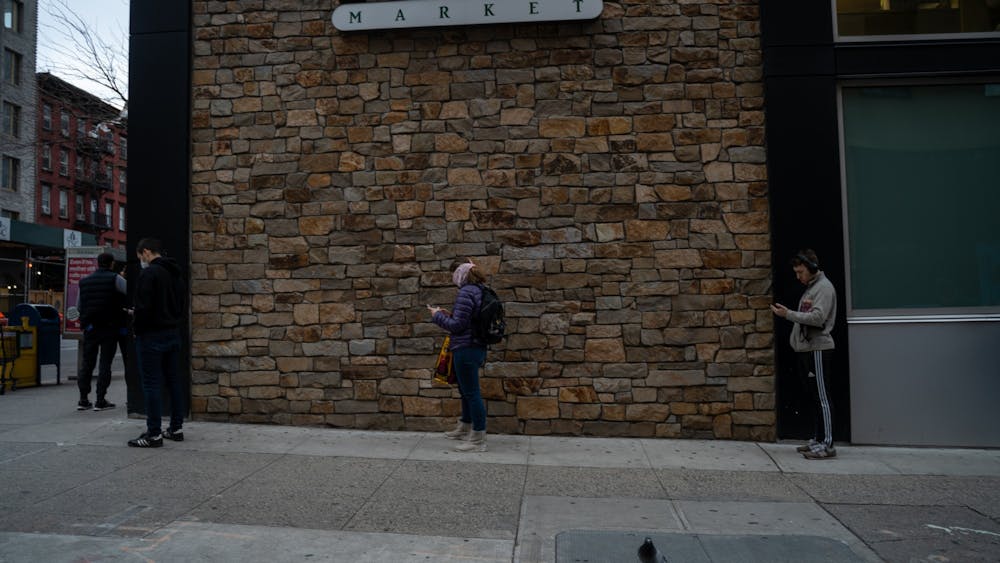
Manhattan residents practicing social distancing while waiting to enter a Whole Foods Market on April 4, 2020.
Although Papandrea himself no longer lives in New York, Papandrea has family members who still do who inform him of the situation, he said.
Enjoy what you're reading?
Signup for our newsletter
"The streets are dead silent and the city is basically on a standstill for the most part," Papandrea said one of his family members had told him.
Papandrea said he found UR's handling of the situation "conflicting," adding that the modification of the Richmond Guarantee summer fellowship had been the most personally damaging.
"I already have had to turn down three internship opportunities due to the restrictions placed by the school on transitory internships," Papandrea said.
The restrictions do not allow students to receive funding for internships outside a student's hometown or Richmond, and all in-person internships cannot begin until June 15 if the student wants funding or course credit.
Papandrea said that he expected to turn down the remaining two internships that he was waiting to hear back from.
"I don't really understand why any internships negotiated to begin after the incredibly late start date would have to be in a student's 'home community,' whatever that actually means," Papandrea said. "If you're taking it to mean driving distance, it's already assuming that everyone has access to a vehicle. For students who live outside of metro areas, there really is no recourse simply due to a lack of opportunity."
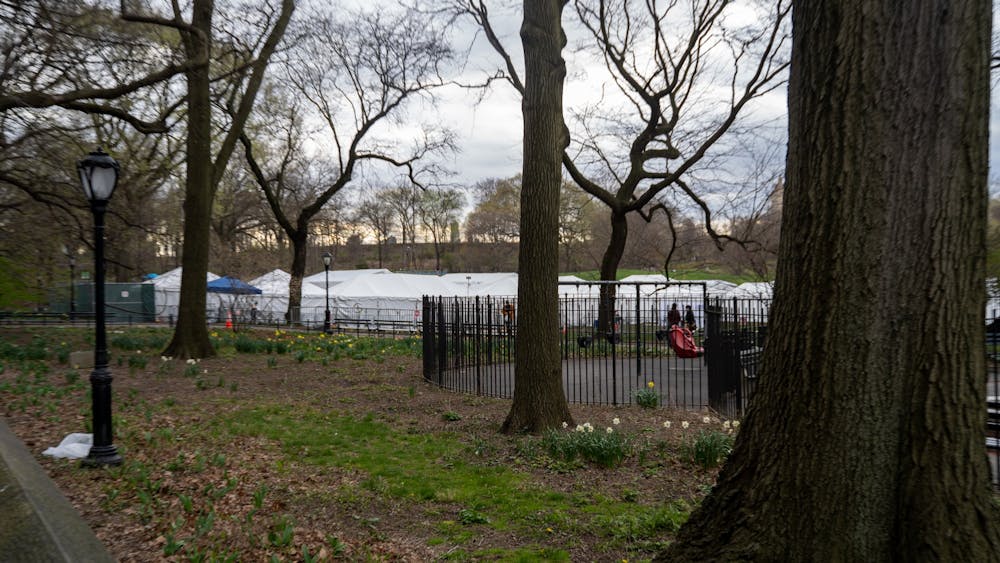
A temporary tent hospital set up in Central Park on April 4, 2020. The hospital, which is situated directly next to a playground, was established to deal with patient overflow.
Alice Vo, a senior from Harlem, has stayed indoors because her father worried that as an Asian-American she could be a "target of attack" during the pandemic, she said. Vo and her family have been strongly cohering to the distancing rules, leaving her with few activities and ways to cope with the pandemic, she said.
“My daily life mostly comprises me staring outside my window since it’s really my only connection to the outside world,” Vo said.
Vo was initially granted permission to stay on campus, but three days later had to submit another request, she said. The second request was approved, but her family had already decided to pick her up in case it was not, she said.
Vo said the application process to stay on campus had been tedious.
“I cried for about an hour because I was scared to go home and risk infecting my 80-year old grandmother,” Vo said. “I wrote a long, long email to the university telling them why I deserved to stay. After the email, I had this weird sense of hopelessness. Not just with COVID-19 but with the university. I was really angry that I have to beg and plead with the school to stay. It was humiliating to me.”
Vo’s parents are fruit vendors in Chinatown and are considered essential workers, she said.
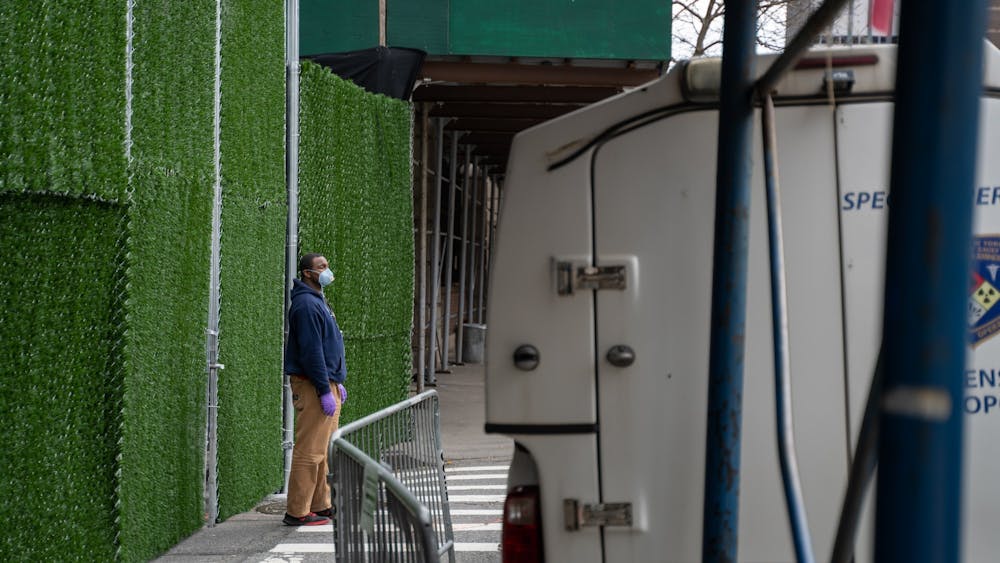
A member of the medical examiners office stands guard on E 30th St outside Bellevue Hospital. Behind it lay multiple refrigerator trucks operating as temporary morgues, as well as soldiers.
Lorea Hernandez, a junior who lives in Manhattan, was approved to remain on campus but said it had not been easy.
“It's just mentally straining, and the school could’ve handled it a lot better and just more humanely and not have students spell out their whole life stories just so they can stay in the rooms they pay for,” Hernandez said.
Hernandez, who emigrated from the Dominican Republic, said the economic effects of the pandemic were harsher for some than others.
“This has affected everyone negatively but I think especially students of color who come from low-income families even more because some students become a financial strain for their parents who also probably are facing unemployment at this point,” she said.
Vo agreed, saying that anxieties were higher for those in her family who speak limited English.
“This virus isn’t an equalizer,” Vo said. "It is predominantly impacting the poor and most vulnerable groups, and I feel that this narrative is often neglected."
UR is continuing to fundraise for its many financial aid programs, wrote Cynthia Price, associate vice president of media and public relations, in an email to The Collegian on April 14.

A mostly empty Times Square with advertisements urging people to stay safe and practice safe hygiene. Many of the signs emphasized the importance of community, adding that when this ends we will be stronger and more united than ever.
Amid health concerns, some students have criticized many aspects of how UR handled their situation. Vo said that as a senior she felt rejected.
Over the past few weeks, the deans of Westhampton and Richmond colleges and UR president Ronald Crutcher offered sympathy and apologies to students. For students such as Vo, this sympathy felt impersonal.
“I am allowed to be angry with the way this situation was handled," Vo said. "I am allowed to be upset and sad. The school threw some of their most vulnerable people under the bus. In the end, I felt like this incident reminded me I’m just a figure or a number to the university.
"It doesn’t matter if I survive this or thrive during this mess. I was told my diversity is important, but when push came to shove, my diversity became a liability for the university."
UR has offered condolences and commitment to students.
"These are challenging times for all of us, and in every sector, but the university’s mission has not changed and our commitment to access and inclusion has not changed," Price wrote. "President [Crutcher] continues to consider these among the university’s highest priorities."

The USNS Comfort docked at Pier 90 on April 5, 2020. Armed soldiers surrounded the ship in an attempt to stop photographers.
Some students in the New York metropolitan area left the area to seek safety. Dan Scherzer, a junior from Manhattan, left the city with his family to go upstate to Hudson, New York.
“It’s easy to forget how bad the city is right now being up here and away from all that," Scherzer said. "I have the ability to go outside into a backyard if I want some fresh air instead of walking around Manhattan trying my best to avoid being near other people. At the same time, there are some similarities to the city.
"All non-essential businesses are closed up here too, and restaurants are takeout only. The supermarkets aren’t fully stocked and there is tape by checkout marking off the appropriate distances people should stand from each other."
Scherzer said he and his family had to self-quarantine for 14 days after arriving in Hudson.
“I think Richmond made the wrong decision in informing us that school would be online just temporarily instead of initially moving online for the whole semester,” Scherzer said. “I know this pandemic has affected all of our lives in different ways, but if we keep interactions with others at a minimum and find things to do to occupy ourselves, whether that be Netflix, books, puzzles, exercising, et cetera, this will be over before we know it.”
Contact visual editor Ben Wasserstein at ben.wasserstein@richmond.edu.
Support independent student media
You can make a tax-deductible donation by clicking the button below, which takes you to our secure PayPal account. The page is set up to receive contributions in whatever amount you designate. We look forward to using the money we raise to further our mission of providing honest and accurate information to students, faculty, staff, alumni and others in the general public.
Donate Now
